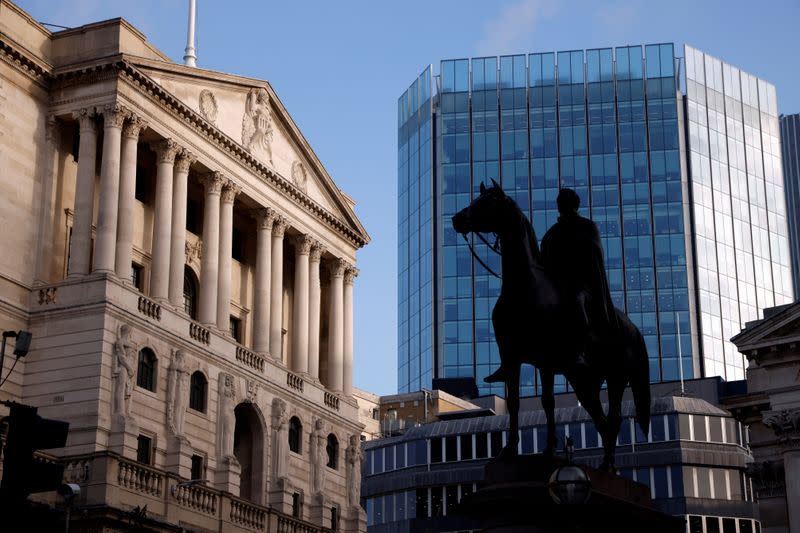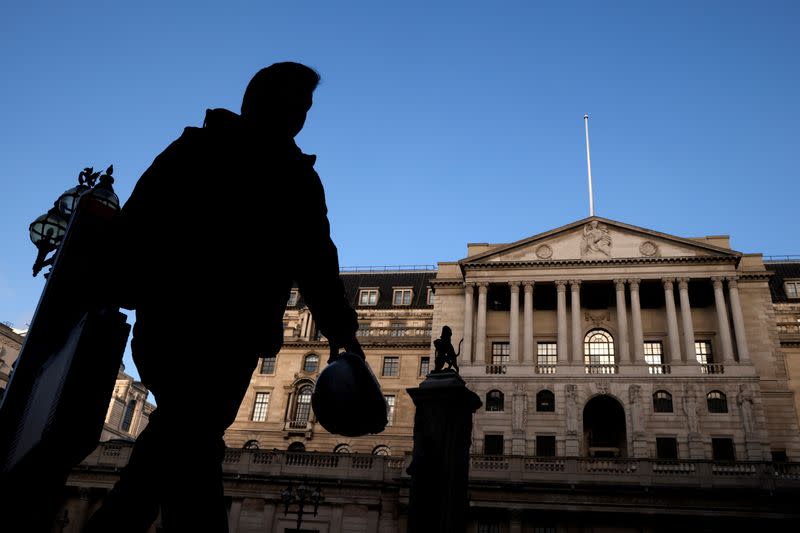Bank of England ready to tolerate a Brexit inflation spike
By William Schomberg, Andy Bruce and David Milliken
LONDON (Reuters) - The Bank of England said it was ready to tolerate an inflation spike in the event of a no-deal Brexit in two weeks' time, but kept its stimulus unchanged as Britain and the European Union enter the end game of their trade deal talks.
The BoE, as expected, did not add to its 895 billion-pound ($1.2 trillion) bond purchase programme, after ramping it up by 150 billion pounds last month, and announced it would continue purchases at their current pace until early February at least.
The British central bank also kept its benchmark interest rate at a historic low of 0.1%.
London and Brussels are locked in negotiations to avoid the shock of import tariffs on trade from Jan. 1, on top of the damage wrought by the COVID-19 pandemic.
The BoE said it was ready to accept inflation rising temporarily above its 2% target if a no-deal Brexit caused sterling to fall sharply.
"Compared with previous periods during which non-negotiated Brexit outcomes had been possible, the economy was starting from a weaker position with greater spare capacity, increasing the Committee's tolerance for a temporary overshoot in inflation," the BoE said after a meeting of its Monetary Policy Committee.
"It would be important to ensure that medium-term inflation expectations remained well-anchored."
Samuel Tombs, an economist with Pantheon Macroeconomics, said the comments represented "the clearest signal yet from the MPC that they would ease monetary policy, in the unlikely event of no-deal".
Britain's budget forecasters say a failure to strike a trade deal would wipe an extra 2% off economic output in the short term, drive up inflation and unemployment and add to public borrowing of 400 billion pounds this year.
Even with a deal, the BoE thinks the economy will suffer as companies struggle with paperwork, port delays and other effects of leaving the world's biggest single market.
The BoE's bond-buying programme is widely seen as its most likely weapon should it need to return to the stimulus pump.
It made no mention on Thursday about its review of the feasibility of taking interest rates below zero for the first time, something done in the euro zone and other countries.
The BoE said it planned to keep the pace of its purchases of British government bonds broadly unchanged in early 2021, but reiterated it could move faster "should market functioning worsen materially again."
Investors are betting increasingly on Britain and the EU striking a deal.
Sterling hit a two-and-a-half-year high against the U.S. dollar on Thursday. EU Brexit negotiator Michel Barnier said "good progress" was being made.
The BoE also said Britain's economy was likely to shrink by just over 1% in the fourth quarter, less than its projection in November for a 2% contraction. But the latest coronavirus restrictions were tighter than it had thought, so a recovery in the first three months of 2021 may be weaker than expected.
Vaccines were likely to support the economy, but MPC members had differing views on the extent of the boost.
The BoE extended by six months, until Oct. 31, 2021, the drawdown period for lenders using its Term Funding Scheme for small and medium-sized enterprises.
(Reporting by David Milliken and Andy Bruce; writing by William Schomberg; editing by Michael Holden, Larry King)

 Yahoo News
Yahoo News 

